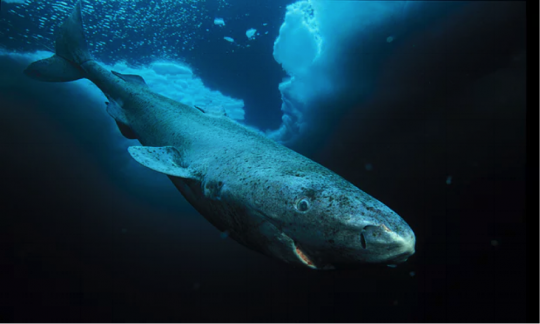
Longevity Record-Smashing Shark May Reveal Secret to Long Life
- Scientists discover longevity secret in an unsuspected place. Find out more…
- Groundbreaking research shows this type of water may lengthen your life span.
- Plus, one way to increase your longevity today!
Dear Living Well Daily Reader,
“Wait. So you’re saying this shark was alive before Abraham Lincoln was born?”
Over the weekend, I had a conversation with a friend about a new and fascinating scientific finding — a 272-year-old shark.
Well, to be fair, this shark could be only 272 years of age, according to researchers. They used carbon dating of the eye lenses to confirm the age, which is in the range of 272–512 years.
Called a Greenland shark, these giant carnivores live in the frigid arctic waters near Greenland.
Until this amazing discovery, the bowhead whale held the record for longest-living vertebrate, at 211 years. However, this ancient Greenland shark surpassed that, possibly by a few centuries.
But big marine vertebrates aren’t the only things living in the oceans for hundreds of years. The ocean quahog is a clam known to live up to 507 years, which shatters the life spans of both the shark and the whale.
So what do all three of these long-living organisms have in common?
They live in cold water.
And apparently that might be the secret to growing old.
![]() Cold Waters, Long Lives
Cold Waters, Long Lives
Steven Austad, an aging researcher at the University of Alabama, reports that this finding “moves back the vertebrate longevity record by a substantial amount.”
To put a finer point on this, he went on to say, “Just imagine what it would be like to have muscles like these sharks, that have been working nonstop since the time of the Pilgrims.”
Steven Austad, an aging researcher at the University of Alabama, reports that this finding “moves back the vertebrate longevity record by a substantial amount.”
To put a finer point on this, he went on to say, “Just imagine what it would be like to have muscles like these sharks, that have been working nonstop since the time of the Pilgrims.”

An old Greenland shark just minding its business and setting longevity records. Source: thegaurdian.com
Austad notes that cold temperatures may be a contributing factor to all three of these organisms’ remarkable longevity. And it may be something we humans can learn from:
There’s something going on in those muscles we’d very much like to know about. Whatever sort of physiological tricks the sharks have to living that long, they’re probably something that humans don’t have. But it’s something that, if we discover what it is, we might be able to adapt it to human use.
Another researcher, Shawn Xu, a geneticist at the University of Michigan, also believes that cold water helps lengthen the lives of these animals by slowing down biochemical activity and growth.
Xu’s work in nematodes (a type of worm) shows that cold temperatures can also activate anti-aging genes. These genes help the animals produce better proteins, fight infections and rid their bodies of DNA-damaging molecules and can extend their life span.
Further research on the shark and the quahog is expected. And it may yield results that could one day extend human lives.
Until then, there’s a way to reap some of the health benefits of cold water.
And you don’t have to go to the ocean to do it.
![]() Hit the Showers
Hit the Showers
Studies have shown that exposing your body to cold water in short bursts may help improve your overall health, boost your immune system, and increase your tolerance to stress and/or disease.
In one study, participants who swam regularly in cold water during the winter experienced drastic decreases in uric acid levels. In higher concentrations, uric acid can increase your risk of diabetes, heart disease, fatty liver, obesity, high blood pressure and kidney disease.
In addition to reducing uric acid levels, the cold water exposure also boosted glutathione. Glutathione is a powerful antioxidant that can reduce premature aging and infections and combat the effects of stress.
Moreover, cold showers may also help you lose weight by activating your “good” fat.
There are two different types of fat, brown fat and white fat. Brown fat keeps you warm in colder weather, also acts more like a muscle because it burns energy, instead of storing it.
White fat is the “bad” fat that accumulates around the waist, hips, neck and thighs when we eat a poor diet.
According to the Joslin Diabetes Center, a Harvard Medical School affiliate, brown fat is activated when the body is exposed to cold temperatures and can lead to the burning of white fat.
A study shows this to be accurate. Exposing the participants to extreme cold temperatures activated the brown fat in some participants by 15fold. According to the study, this means you could lose weight by exposing yourself to cold temperatures — like taking cold showers.
If shivering through your whole shower doesn’t sound appealing to you, you can shorten the length. Some folk swear by taking a normal-temperature shower and then turning the temperature down to freezing for the last minute.
There’s no evidence that taking cold showers will make you live to be 272, but trying them certainly can’t hurt.
Live well,

Natalie Moore
Managing editor, Living Well Daily
Sources
[1] Greenland shark may live 400 years, smashing longevity record
[2] Talk About An Ancient Mariner! Greenland Shark Is At Least 272 Years Old
[3] Uric acid and glutathione levels during short-term whole body cold exposure
[4] Turning Up the Heat on Brown Fat
[5] Benefits of Cold Showers: 7 Reasons Why Taking Cool Showers Is Good For Your Health
Written By Natalie Moore
Natalie Moore is a dedicated health researcher with a passion for finding healthy, natural, and science-based solutions. After a decade of direct healthcare experience in western and natural medicine, she was involved in public health research before joining Living Well Daily.
View More Free Articles
Exercise Activates This Hidden Cancer Defense System
I’ve heard my fair share of groaning from patients when I bring up exercise. I know I’m in danger of losing my “Favorite Doctor” badge every time I suggest putting on those workout shoes and heading out the door. But you might want to retire those groans after you read this—or at least put them...
This Sleep Mistake Is Doubling Your Disease Risk
Think your inconsistent bedtime is just a harmless habit? Think again. New research reveals that going to bed at different times each night isn’t just making you tired—it could be dramatically increasing your risk of serious diseases. But the key to making sure poor sleep doesn’t derail your health goals likely isn’t what you think…....
Stop Obsessing Over Diet Trends
Can we stop with the endless diet debates already? Every other week there’s a new headline shouting about which diet is best for weight loss, heart health, or diabetes. Paleo, keto, low-carb, high-protein… it’s exhausting. And now, a new meta-analysis is out comparing the Mediterranean diet, the DASH diet, and something called AHEI (that’s “Alternative...
A New Reason to Ditch Processed Junk
If you’ve ever walked the inside aisles of your local grocery store and thought, “This is all just junk,” your instincts were spot on. A new study published in the journal Thorax just added another red flag to the list of dangers linked to ultra-processed food—a 41 percent higher risk of lung cancer. That’s right....
When Being Winded on Stairs Is Serious (And When It Isn’t)
I had an athlete visit me recently because he experienced shortness of breath while climbing stairs. He is in great shape, so he was worried about what it might mean. “Doc,” he said, “I run five miles three times a week. Why am I huffing and puffing after two flights of stairs?” His concern is...
Study EXPOSES Hidden Danger Lurking in Your Car
We think of our homes and cars as safe havens. But according to a startling new study, they may be flooding your lungs with microscopic plastic particles—every single day. Researchers in France recently found that adults inhale an average of 68,000 microplastic particles daily from indoor air alone. To put that in perspective, that’s about...
Mailbag: Is Modern Food Making You Snore?
“What can cause snoring, and is there a way to correct this issue?” —Seeking Silence Hi Seeking, Snoring happens when the soft tissues in your throat relax and vibrate as air passes through during sleep. While several factors can cause snoring—from sleep position to nasal congestion—I want to share one trigger that might surprise you....
Simple Food Swap SLASHES Dementia Risk 28%
Let’s be honest… who would jump at the chance to cut their dementia risk by 28 percent. And no, you don’t need to run marathons, survive on broccoli, or learn to play the zither (whatever that is) to make it happen. All it takes is one easy swap—something that’s probably already in your refrigerator. Researchers...
This SMART Floss Exposes Hidden Health Danger
Scientists have created dental floss that doesn’t just clean between your teeth—it also tracks your stress while you’re flossing. Now, I know what you’re thinking… “Great—now even flossing is going to stress me out by telling me how stressed I am.” But this fascinating new tool from Tufts University could be a game-changer for understanding...
Is This "Safe" Sweetener Damaging Your Brain?
The headlines are alarming… “Popular Sugar Substitute Linked to Brain Cell Damage” and “Erythritol Could Damage Critical Brain Barrier” are just two of the dozens I’ve spotted recently. But before you toss every sugar-free product in your pantry, let’s take a closer look at what this study actually shows—and what it doesn’t. The latest research...









